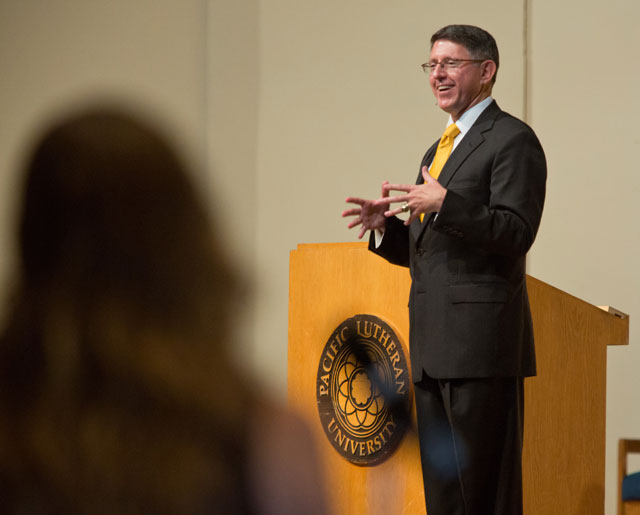Page 282 • (2,826 results in 0.351 seconds)
-
Management: Stop Disciplining and Start Teaching” and “Music Literacy: Finding the Key to Independent Learning in the Choral Classroom.” In addition to her K-12 work in the public schools, Ms. Whitham taught undergraduate courses in aural skills and keyboarding at Western Washington University and conducted the University Men’s Chorus, University Women’s Chorus, and WWU’s premier choral group, Western Voices.
-
semester hours In addition to the music courses listed, all music education majors are required to take the following courses in the School of Education. EDUC 391: Foundations of Learning (3) EPSY 361: Psychology for Teaching (3) EDUC 320: Issues in Child Abuse and Neglect (1) EDUC 468: Student Teaching – Secondary (10) The WEST-E exam in the appropriate area of concentration is taken during the senior year and must be passed prior to student teaching. Admission to the School of Education requires
-
said. “It is about finding that connection to the food you’re eating and who is producing it,” Perez said. Trinity Lutheran GardenLutes from the Center for Community Engagement & Service work in the Trinity Lutheran garden. Kevin O’Brien, PLU’s chair of environmental studies, said the key is people learning the story behind their food and asking if they’re comfortable with that story. “The easiest and most damaging habit is thinking that food comes from a grocery store,” said O’Brien, who is also
-
or Curriculum: A record of program agreements between UW offices and outside agencies. May include the following types of agreements: those that provide/obtain a learning experience for students outside the classroom, e.g., internships, clerkships, clinical practicums, traineeships, etc.; that provide/obtain reduced tuition and preference in admission for WWAMI region (Washington, Wyoming, Alaska, Montana and Idaho) students or students from participating schools in other countries. Official Copy
-
office on the first floor of the library! Questions contact: 253-535-7518 https://www.plu.edu/aac/COUNSELING CENTERPLU recognizes that college presents a wide range of challenges. College is a time for personal growth, learning, and self-knowledge, but it isn’t always easy. Some students need a place to develop coping skills for social, academic, and personal growth. Other students face more complex problems like anxiety, depression, and similar concerns. Our experienced team of licensed
-

, PLU2010, and now PLU2020 have been important opportunities for the community to think hard about its strengths and weaknesses and its opportunities and challenges. All three documents were important to me in learning about the university and thinking about the way ahead. Now it seems time for all of us to put into operation a planning process that will carry out the intentions of these planning documents. Over the summer, the President’s Council (which is made up of the Provost, the Vice Presidents
-
Achievement (MESA); Residential Life Office; Student Engagement Office; Center for Gender Equity; Diversity Center; Women’s and Gender Studies Program Executive Committee; and the University Dispute Resolution Committee, among others. The University Diversity Advisory Board will be appointed by the president, in consultation with the UDC co-chairs. General Purpose: To lead the development of a strategic plan for a diverse and inclusive living, learning, and working community and engage the administration
-

diversity statement: Diversity is “the condition of difference necessary to all life and creativity.” (Martusewicz, Edmundson, and Lupinacci, Ecojustice Education: EcoJustice Education: Toward Diverse, Democratic, and Sustainable Communities, 2011) Thus, at PLU, diversity is intrinsic to the vitality of learning, resilience and growth. This statement expresses diversity as a value inherent in PLU’s identity as an institution of Lutheran Higher Education and as core to our mission “to educate students
-
traditional lands of the Nisqually, Puyallup, Squaxin Island and Steilacoom peoples; we acknowledge and respect the traditional caretakers of this land.” This exhibit also highlights articles that speak to how land acknowledgements have been used, what they communicate, and what they don’t say. Language, oral and written, is key to culture transmission and retention. To revitalize Twulshootseed, the Puyallup Tribe of Indians has a language program and a website with extensive language-learning resources
-
coaching soccer at University Prep in Seattle. Jacob enjoys traveling, dancing, writing, photography and is learning French. Welcoming the Stranger I: Immigrant Workers in a Wisconsin Dairy Community—a 20 –Year ExperimentPanel Title: Welcoming the Stranger: Immigrant Workers in a Wisconsin Dairy Community—a 20 –Year Experiment Who: John Rosenow Title: Dairy Farmer Bio: John Rosenow is a fifth-generation dairy farmer in Cochrane, Wisconsin. He began employing immigrant workers at his Buffalo County
Do you have any feedback for us? If so, feel free to use our Feedback Form.


